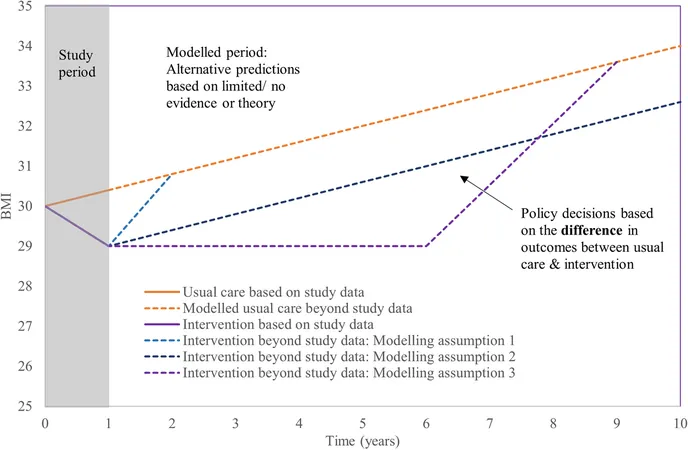
Introducing the PHEM-B Toolbox: Revolutionizing Public Health Economic Modelling by Understanding Behavioural Influences
2024-10-12
Author: Wei Ling
Exploring the Intersection of Public Health Interventions and Economic Modelling
Public health interventions are designed to inspire individuals or populations to modify their behaviours for improved health outcomes, often functioning within intricate systems. Understanding these influences is crucial, as traditional economic models may overlook the non-linear effects and unexpected outcomes that arise at the population level. This is essential for policy-makers who allocate limited resources effectively.
Health economic models assess the cost and effectiveness of these interventions to guide informed decisions. However, many existing models fail to accommodate the myriad determinants affecting individual and population behaviours—knowledge is lacking about precisely how these interventions yield long-term results. Current modelling techniques range from simple arithmetic calculations to complex individual-level simulations, yet most do not reflect the complex social and behavioural context in which these interventions operate.
Understanding Behaviour: Key to Predicting Long-Term Outcomes
The effectiveness of public health programs is largely dictated by human behaviour—an intricate blend of motivations, capabilities, and external opportunities. Health economic models often simplify this complexity, predominantly focusing on biological risk factors without incorporating the influence of behavioural determinants such as lifestyle choices, social norms, and motivation.
To accurately predict the long-term effectiveness of interventions, public health models must evolve to consider these behavioural drivers alongside individual characteristics. The lack of comprehensive theoretical frameworks in existing research has led to crude assumptions about the sustainability of intervention impacts, often oversimplifying the behaviour change process.
The Role of Behavioural Theories in Innovating Health Models
Numerous behavioural theories exist across disciplines like psychology and sociology, aiming to elucidate the links between various influences on behaviour. While frameworks such as the COM-B model provide insight into how Capability, Opportunity, and Motivation contribute to behaviour change, their implementation within health economic models remains limited.
Crucially, integrating behavioural theory into model design could bridge the gap between short-term intervention effects and long-term behavioural maintenance. The Behaviour Change Wheel, for instance, presents a systematic method for defining intervention strategies based on these organisational principles.
Harnessing the Power of Networks and Environmental Enhancements
The social environment significantly influences individual behaviours—factors like social norms and identity can either facilitate or hinder behaviour change. Social Norms Theory and Social Identity Theory highlight how perceptions and affiliation with social groups sway individual behaviours, a consideration often neglected in health economic models.
The life course perspective also emphasizes that health trajectories and behaviours evolve over individuals' lifespans, suggesting that interventions should be designed and tested at critical life stages. Ecological frameworks further support this idea by intertwining individual and environmental influences, advocating a multi-level approach to intervention.
The PHEM-B Toolbox: A New Era for Health Economic Modelling
The PHEM-B Toolbox emerges as a cutting-edge resource designed to integrate behavioural influences systematically into health economic models. Its creation is announced to support researchers and decision-makers by offering a suite of methods to incorporate complex social interactions, behavioural theories, and individual characteristics into their projections for public health interventions.
The aim is not only to improve model accuracy but also to aid in making strategic decisions that enhance health outcomes efficiently. Methods suggested include:
1. **Collaboration**: Foster joint efforts between health economic modellers and behavioural scientists to establish more relevant assumptions and enhance the understanding of interventions.
2. **Literature Review**: Investigate existing behavioural theories and studies on behaviour maintenance to inform modelling beyond initial intervention follow-ups.
3. **Behavioural Systems Mapping**: Visualize the interactions between behaviours, influences, and interventions for better clarity and modelling accuracy.
4. **Agent-Based Modelling (ABM)**: Simulate individual-level behaviours and their complex interactions, capturing the influence of social networks and environment on health choices.
5. **Differential Equation Modelling**: Provide insights into population dynamics and behaviour change over time, factoring in both individual variables and macro-level influences.
6. **GIS Integration**: Utilize Geographic Information Systems to explore the relationship between physical environments and public health behaviours.
7. **Social Network Analysis**: Investigate the social structures surrounding individuals and their influence on health-related behaviours.
8. **Expert Elicitation and Qualitative Research**: Gather insights from experts and analyze behaviours qualitatively for a deeper understanding of health impacts.
The Future of Public Health Interventions
By harnessing the insights from various fields and adopting a collaborative, interdisciplinary approach, the PHEM-B Toolbox stands to deliver a significant leap forward in public health economic modelling. These advancements promise not only improved predictions of health outcomes based on behaviours but also effective resource allocation that ultimately benefits community health.
Stay tuned as this innovative toolbox transforms how public health interventions are modelled and evaluated, paving the way for healthier populations and fewer health disparities. Are you ready for this health revolution?


 Brasil (PT)
Brasil (PT)
 Canada (EN)
Canada (EN)
 Chile (ES)
Chile (ES)
 España (ES)
España (ES)
 France (FR)
France (FR)
 Hong Kong (EN)
Hong Kong (EN)
 Italia (IT)
Italia (IT)
 日本 (JA)
日本 (JA)
 Magyarország (HU)
Magyarország (HU)
 Norge (NO)
Norge (NO)
 Polska (PL)
Polska (PL)
 Schweiz (DE)
Schweiz (DE)
 Singapore (EN)
Singapore (EN)
 Sverige (SV)
Sverige (SV)
 Suomi (FI)
Suomi (FI)
 Türkiye (TR)
Türkiye (TR)